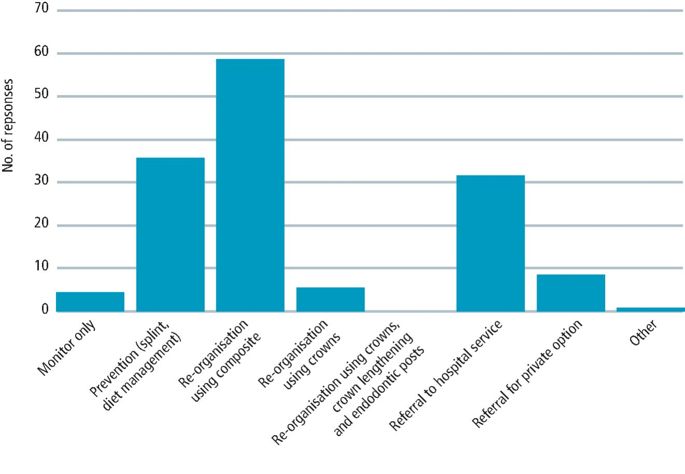British Dental Journal ( IF 2.0 ) Pub Date : 2020-03-13 , DOI: 10.1038/s41415-020-1316-1 Matthew Condon 1 , Kenneth Eaton 2

|
Introduction Restoring complex tooth wear (TW) cases is technically challenging and not well-remunerated under the NHS General Dental Service (GDS) contract. Therefore, numbers of referrals to secondary care are increasing, but these are often rejected as dental hospitals have a high workload. This may make it difficult for patients with TW to access appropriate care unless paying privately, which may be costly for them.
Aim The aim of this investigation was to understand how general dental practitioners (GDPs) in Leeds manage complex TW cases.
Methods A postal questionnaire was designed and piloted before postal distribution to all GDPs with a Leeds postcode (n = 289). Non-responders were sent reminders to complete the questionnaire. The questionnaire included questions on the place of qualification and experience of the dentists, their management of an example complex TW case and the potential barriers to management of similar cases. The resulting data were statistically tested using Kruskal-Wallis and Mann-Whitney tests.
Results A total of 148 (51%) responded to the questionnaire. There was low confidence in restoring complex TW cases with a mean score of 4.65 out of 10 (0 being not confident at all and 10 being very confident). Only 30 respondents (21%) reported that they would treat complex TW cases under the current NHS GDS contract, and 90 (62%) reported that they had experienced difficulty referring these cases to hospital. Kruskal-Wallis testing showed increased confidence in restoring by those with a diploma or MSc (p = 0.004 and p = 0.014 respectively). Mann-Whitney testing showed those undertaking a higher percentage of NHS work were less likely to restore these cases (U = 2,100; p = 0.02).
Conclusion These results suggest that Leeds patients with complex TW may have difficulty in accessing appropriate care under the current NHS GDS contract. The results highlight the benefits of postgraduate education on confidence in restoring complex TW cases.
中文翻译:

对利兹的普通牙科医生如何处理复杂的牙齿磨损案例进行了调查。
简介在NHS普通牙科服务(GDS)合同下,修复复杂的牙齿磨损(TW)案例在技术上具有挑战性,而且报酬不高。因此,转诊二级保健的人数在增加,但是由于牙科医院的工作量很大,这些转诊常常被拒绝。除非私下付费,这可能使TW患者难以获得适当的护理,这对他们而言可能是昂贵的。
目的这项调查的目的是了解利兹的普通牙科医生(GDP)如何处理复杂的TW病例。
方法设计邮寄问卷并进行试点,然后以利兹邮政编码(n = 289)分发给所有GDP。向未回答的人发送提醒以完成问卷。问卷包括以下问题:牙医的资格和经验的位置,他们对一个复杂的TW案例的管理以及对类似案例进行管理的潜在障碍。使用Kruskal-Wallis和Mann-Whitney检验对所得数据进行统计检验。
结果共有148份(51%)回答了问卷。在恢复复杂的TW病例中,置信度较低,平均得分为4.65分(满分10分)(0个完全不自信,10个非常自信)。只有30名受访者(21%)报告说,他们将根据当前的NHS GDS合同治疗复杂的TW病例,而90名受访者(62%)报告说,他们很难将这些病例转诊到医院。Kruskal-Wallis测试显示,拥有文凭或理学硕士的人对恢复的信心增强(分别为p = 0.004和p = 0.014)。曼恩·惠特尼(Mann-Whitney)测试表明,从事较高比例的NHS工作的人恢复这些病例的可能性较小(U = 2,100; p = 0.02)。
结论这些结果表明,根据当前的NHS GDS合同,患有复杂TW的利兹患者可能难以获得适当的护理。结果突出了研究生教育对恢复复杂的TW案例的信心的好处。











































 京公网安备 11010802027423号
京公网安备 11010802027423号